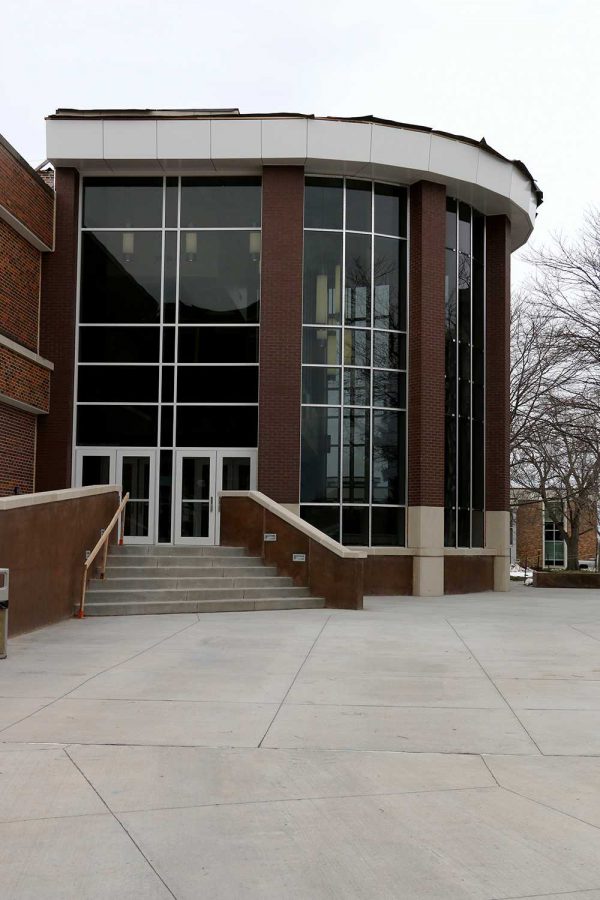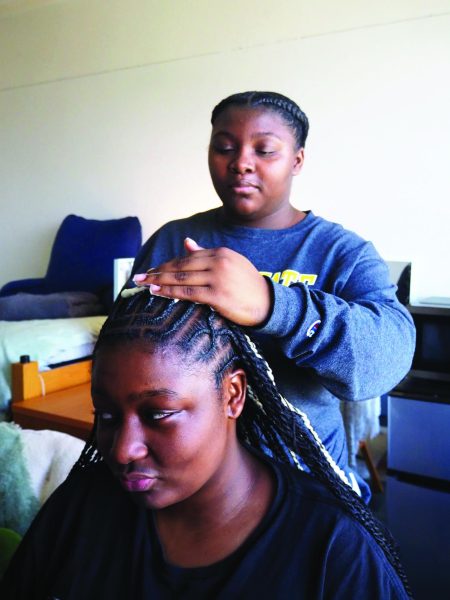WSC provides wide ranging services to guide students
October 6, 2020
The Holland Academic Success Center, Student Health and Counseling Services, Disability Services, Career Services, and TRIO are all individual WSC campus services that work together to create a holistic approach to academic success.
HOLLAND ACADEMIC SUCCESS CENTER
The Holland Academic Success Center, located in room 232 of the U.S. Conn Library, is a service that provides academic support and coaching to WSC students. The service has two sections: the academic advising and coaching side and the academic success side.
For the academic advising and coaching side, the center has two professional advisors for helping students with figuring out their schedule and registering for classes.
Academic advisors and coaches are also available for meeting with students one-on-one for setting academic and career goals, outlining the necessary steps to reach those goals and for developing academic skills, such as time management and study strategies.
The student success side provides services that help students succeed outside of the classroom. This includes meeting with student tutors who are specialized in a specific subject. If a student needs help with an assignment in a particular subject or is struggling to understand a concept in a particular class, the student can meet with a specialized tutor who can help them with that subject or class.
Kelly Wenig, director of the Holland Academic Success Center, said there are currently 30 student employees working as tutors. Tutoring is one of the highest paid jobs on campus, with tutors earning $10 per hour.
The center is also in the process of hiring new tutors, beginning in early November and spring. Wenig said he wants to hire 12 to 15 new tutors. He is also trying to change the current model of tutoring, which focuses mostly on tutors that specialized in a certain subject, to one that includes tutors that have generalized knowledge of multiple subjects.
Wenig said the goal of the Holland Center is not just to fix someone’s paper or problem with an assignment, but help students develop permanent lifelong skills.
“The misconception is we are not a teaching service,” Wenig said. “And we are. Our job here is to teach you skills that you need to do well. We are not going to replace faculty members, but we will support them…Ultimately, that is the one thing I would change is to get students to know that we are here to supplement your learning and as a way to teach the kind of skills you are maybe not getting directly from the classroom. Like, study skills.”
Wenig said his goal is not just to help students simply “cross the finish” by getting a degree, but also maximize the full potential out of students.
DISABILITY SERVICES
Disability Services is new on campus. The office had been a part of the Holland Academic Success Center. The services provide support and accommodations for students that are medically diagnosed with a disability. These accommodations can include housing accommodations, such as having a dorm room on the ground floor, flashing fire alarms, and wheel chair access halls.
Classroom accommodations might include notetaking scribes, sign language interpreters and audio recorded lectures. Exam accommodations, such as extended test-taking time, exams in audio format and exams taken in low-distraction areas might also be included.
Tara Holdsworth, the educational support and disability coordinator, said there is a wide variety of accommodations as every student she works with is unique and the accommodations are made with an individualized plan for each student.
“We provide a variety of accommodations so that students can have equal access to campus,” Holdsworth said.
Holdsworth said a large part of Disability Services is to create awareness between the students with disabilities and the professors. Since the medical information is confidential, the office doesn’t share information about students with the professor. But the office does work with professors in providing the necessary accommodations.
Disability Services also works with students who have temporary conditions, such as a student with an injury or an illness. Students with disabilities are not always apparent as some disabilities are not visible.
“The majority of the students that we serve to, have ‘invisible disabilities,’” Holdsworth said. “That would be things like depression, anxiety, PTSD, learning disabilities, as well as ADHD. Those are some of the most common ones. A lot of the students we serve actually have disabilities that you can’t see.”
STUDENT HEALTH COUNSELING SERVICES
Student Health and Counseling Services provide WSC students with free services that are already paid for in student fees, unless a student needs x-ray or lab work done which would need coverage by the student’s insurance. Student Health has a nurse that is available from 8 a.m. to 5 p.m., Monday to Friday. Student Health also works with Faith Regional Medical Center to have a physician on campus two hours per day.
Alicia Dorcey McIntosh, director of Student Health and Counseling, said she is excited because this year Student Health has a nutritionist that comes to campus once a month to meet with any student that has questions about their diet or nutrition.
Counseling Services has four licensed counselors including McIntosh. The counselors can meet with students for individual therapy or before COVID-19 regulations, group therapy. McIntosh said the individual counseling sessions can deal with anything from homesickness to major depression and anxiety.
Counseling Services works closely with Disability Services in providing students with disability accommodations. Counselors can also refer students to the Holland Center if they need help with academic coaching and tutoring. Counseling Services also offers a career class for college credit that can work with students in career planning.
Student Health and Counseling Services put on a series of out-reach programs about such issue as suicide prevention, alcohol addiction and domestic violence. At the beginning of the semester, Student Health held a handwashing clinic that visited every dorm on campus to educate about handwashing using glo-germ.
McIntosh said Counseling Services works closely with the campus group, Active Minds, to help with goal of destigmatizing the discussion of mental health. “I’m so glad they’re here,” McIntosh said. “Because it is part of life and we want people to get the health that they need…It doesn’t need to be a lifelong struggle, especially at this age.”
CAREER SERVICES
Career Services helps students with career-planning such as finding internships, job searching, part-time employment opportunities, writing resumés and developing job interviewing skills. The staff also hosts yearly events and activities, such as speed interviews, two career fairs, education interviewing day, a teacher fair and a meet the firm for accounting majors. Because of COVID-19 restrictions this year, some events, such as the career fair, held Oct. 6, are virtual.
Jason Barelman, director of Career Services, said she also works with students who are student teaching and then helps them find employment when they graduate.
Career Services has a list of online tools with Cat Tracks, candid career, exploring careers and majors and the Wayne State College Graduate Outcomes. Cat Tracks is an online job board with postings of part-time jobs, internships, full-time jobs that come through Career Services are posted. But Barelman said networking and making connections is an important part of career planning as “only about 20% of jobs are ever posted,” she said. “Most of the jobs that people learn about are learned through word of mouth. Through networking.”
Candid Career is an online database that features thousands of videos of tips job interviews, videos related to the job search, videos on creating resumés and job seeking and videos on how to attend a career fair.
Exploring careers and majors that allows students to select from different majors to see what different jobs are available in that major’s field. Students can then see what other requirements and list of skills would make them more marketable for a particular job. Barelman said she loves this resource because it is very easy to use. She also said she believes almost every major it listed requires strong communication skills.
WSC Graduate Outcomes is list of surveys of WSC graduates that have responded for the last five years. On average, of the over 80% of graduates that have responded to the survey, more than 99% are employed or attending graduate school. There is also a new service on the website called GoinGlobal that allows students to fast track careers at home and abroad, with worldwide job and internship resources for more than 120 locations.
TRIO
TRIO Student Support Services is a support program that provides services for 250 students. Students qualify for TRIO by having met at least one of three requirements, including: being a first generation college student, coming from a family of limited income, and having a diagnosed disability, with an academic need of some sort. TRIO provides students that meet these eligibilities with both academic and personal support. Peer tutoring allows a student to meet one-on-one with a tutor. Tutors can meet with students in the TRIO lab. TRIO members are each assigned a learning specialist and can meet with advisors for individual sessions.
Barbara Hansen, the director of TRIO, said the mentor program offers students studying table nights and the social experiences that include important social interaction while they are here at college.
“Just last week they had a Zen garden social, where students could come and create Zen gardens…They recently had a volleyball social, where students could come and play volleyball. Traditionally, they have a Halloween social, where students can come in costume,” Hansen said.
Freshman who are part of TRIO are also require to attend and participate in the Freshman Seminar, which is a class that teaches them necessary skills for college and about the services that are offered, such as how to budget, study skills and manage their time. Theta Eta Sigma TRIO is a scholars’ honor society that is for TRIO members.
TRIO also works in collaboration with Disability Services, but not every TRIO student has a disability. TRIO students with disabilities have to receive their disability services through the Disability Services office. Hansen said only about a third of their students have a documented disability.
Hansen said almost all of the TRIO staff were first generation students, so they have the experience and can relate to students. She said the staff is a group of passionate people who are willing to meet students’ needs.
Chuck Potosnyak, one of the TRIO academic advisors, said one of the major things TRIO does is a service learning project, where students meet with elderly residents at the Kinship Pointe, an assisted living center, to interview them, learn their personal stories and experiences. At the end of the semester, all of the stories are published photos of the student author’ and residents.









